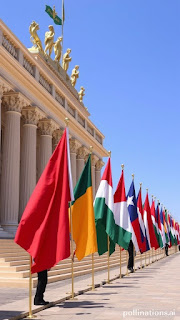Ticker
6/recent/ticker-posts
Brics leaders call for global reforms
July 07, 2025
<br><br>**The Challenges of BRICS Leaders A Call to Global Reforms**<br><br>As the leaders of the BRICS group of developing nations gather in Rio de Janeiro, they stand united in their condemnation of attacks on Gaza and Iran. Their joint statement also calls for reforms of global institutions, marking a significant departure from traditional international relations.<br><br>**A New Era of Diplomacy Emerges**<br><br>In a world plagued by violent conflicts and trade wars, the BRICS bloc is forging a new path forward through multilateral diplomacy. The expansion of this group has created space for diplomatic coordination, reminiscent of the Non-Aligned Movement that emerged during the Cold War. With the G7 and G20 groups hamstrung by divisions and the unpredictable approach of US President Donald Trump's America First policy, the BRICS bloc is well-positioned to take on a more prominent role in global affairs.<br><br>**The Rise of the BRICS**<br><br>Brazilian President Lula da Silva emphasized the significance of the BRICS group, noting that it has inherited the mantle of the Non-Aligned Movement. The BRICS nations now represent over half the world's population and 40 percent of its economic output, making them a powerful force on the global stage.<br><br>**A Complex and Heterogeneous Group**<br><br>However, questions remain about the shared goals of an increasingly heterogeneous BRICS group. The attendance of Chinese President Xi Jinping's premier in his place, as well as Russian President Vladimir Putin's online participation due to an arrest warrant from the International Criminal Court, highlights the complexity and challenges faced by the bloc.<br><br>**A Call for Reform**<br><br>The joint statement condemned attacks against Iran's civilian infrastructure and peaceful nuclear facilities, labeling it a violation of international law. The group also expressed grave concern for the Palestinian people over Israeli attacks on Gaza, and condemned what they called a terrorist attack in India-administered Kashmir. On trade, the joint statement warned that the rise in tariffs threatens global trade, echoing their criticism of Trump's US tariff policies.<br><br>**A New Era of Global Governance**<br><br>In his remarks, Lula da Silva emphasized the need for reforming global institutions such as the United Nations Security Council and the International Monetary Fund to reflect the new multipolar reality of the 21st century. If international governance does not adapt to the changing world order, it is up to BRICS to help bring about meaningful change, he said.<br><br>**Conclusion**<br><br>In a world marked by violence, conflict, and trade wars, the BRICS bloc stands as a beacon of hope for multilateral diplomacy. As leaders of developing nations, they are united in their call for global reforms and a more just and equitable global order. Their efforts to reform international institutions and promote peace may yet prove a turning point in global governance.

Germany swelters as European heatwave moves eastwards
July 03, 2025

Indian, Pakistani troops exchange fire in Kashmir
April 27, 2025

US police hunt gunman who killed lawmaker, husband
June 14, 2025

Pakistan shoots down 25 Indian drones
May 08, 2025

Vietnam apartment block fire kills eight
July 07, 2025
Random Posts
3/random/post-list
Recent in Sports
3/à¦ূগোল%20প্রশ্ন%20ও%20উত্তর/post-list
Popular Posts

Germany swelters as European heatwave moves eastwards
July 03, 2025

Indian, Pakistani troops exchange fire in Kashmir
April 27, 2025

US police hunt gunman who killed lawmaker, husband
June 14, 2025
Menu Footer Widget
Copyright © - StudyNoteGuru All Right Reserved







0 Comments